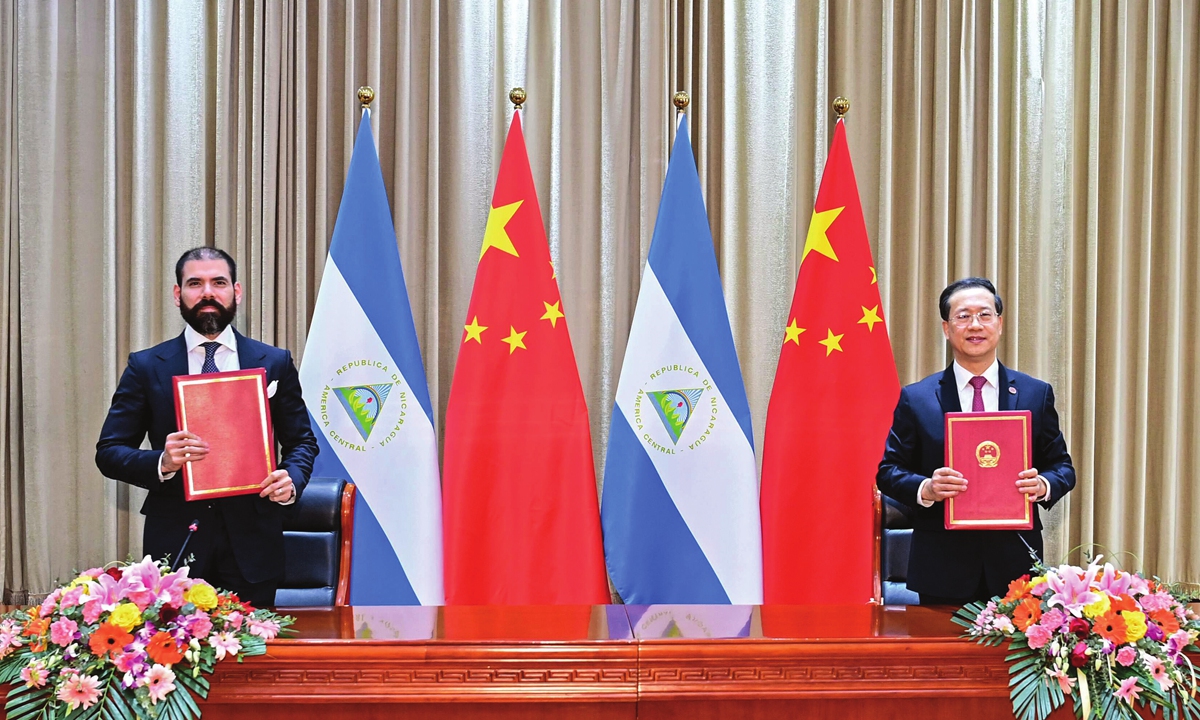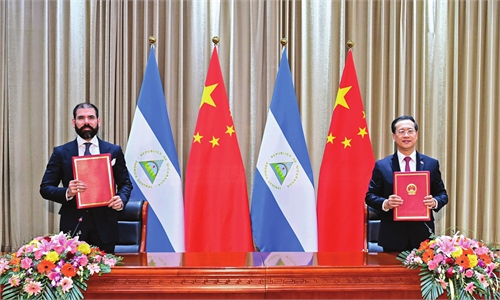
China's Vice Foreign Minister Ma Zhaoxu (right) and Laureano Ortega, the representative of the Nicaraguan government, display a joint communiqué to resume diplomatic ties between the two countries in North China's Tianjin on December 10, 2021. Photo: Xinhua
An Air China plane carrying COVID-19 vaccines donated by China arrived in Nicaragua on Monday. Just last week, Nicaragua broke its "diplomatic relations" with the island of Taiwan. After that, Western media outlets such as Reuters said that US sanctions on top Central American officials had "made China an attractive partner for governments resisting Washington's push to tackle corruption and democratic backsliding" and pushed them toward China. As a matter of fact, it makes no sense for the US to place the blame on China for its loss of trust among Central American countries.Central America, as the US' proverbial "backyard", has been regarded by Washington as a geopolitical tool and a significant means of maintaining US hegemony. Moreover, for the US, these countries are not only sources of cheap labor and low-end industrial raw materials, but also the dumping ground for outmoded American industries. Therefore, domestic interests prompt the US to interfere in the governance of Central American countries, via proxy or through direct coercion, rather than assisting in their governance on the premise of respecting sovereignty.
The US believes the current situation in these countries is far too removed to be part of its own interests. That is one of the reasons why the US didn't invite El Salvador, Honduras, Guatemala, and other countries in this region to its so-called Summit for Democracy on the grounds of their lack of democracy and rampant corruption.
Such extreme selfishness which puts US interests above those of other countries, has led to their chronically lagging economy, rampant corruption and crime, and a growing disparity between the rich and the poor. The root cause lies in the US' century-old contempt for these countries and the US incorporates these countries into its own governance framework out of its own interests, without considering the development of these countries.
"So far from God, so close to the US" might be the greatest misfortune of these countries.
Previously, these countries had no other choices but to turn to the US. However, as China has developed rapidly in recent years, a reference model is being provided for how developing countries can develop from backward agricultural countries to industrialized ones while achieving long-term social stability. At the same time, China is capable of providing the capital, products, and technology they need to develop.
Central American countries have been hit hard by the COVID-19 epidemic. This is a time when any country desperately needs pragmatic governance, particularly in the country's post-pandemic economic recovery. With the decline of its national power, the US has been less capable in providing real help to other countries.
Being pragmatic leads one to the fact that several Central American countries began to separate themselves from the US and are no longer completely dependent on Washington. The new president of El Salvador, after taking office, is committed to reforming old policies. The economic and social conditions mostly remain in bad shape in the few remaining Central American countries which still have "diplomatic relations" with the island of Taiwan. If the US really values Central America, it should consider helping relieve difficulties in its "backyard" on the basis of respect and equality, and thus explore a long-term development model, instead of using the region as a tool to achieve its short-term interests based on its domestic needs.
The US has felt such crises. Recently the US said it is willing to provide a "surge" in aid to help Honduras, trying to win over Xiomara Castro, the newly elected president who previously claimed to break off "diplomatic relations" with the island of Taiwan. However, the US is used to giving rubber checks, promising great amounts of aid but never really delivering on such promises in reality, such as its "Build Back Better World" to counter China's Belt and Road Initiative. It sounds fine, but the US government is reluctant to put enough money where its mouth is. Washington either hopes that the domestic private sector will foot the bill, or hopes to divvy up the price tag among allies. In the end, it only offers up lip service.
The author is executive director of the Latin American and Caribbean Region Law Center of China University of Political Science and Law. opinion@globaltimes.com.cn



